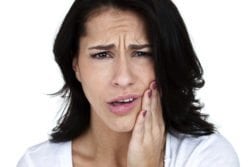Teeth grinding, also known as Bruxism, is a common sign of a TMJ-related disorder. Patients who grind their teeth or clench their jaw are often unaware that they are doing so until complex dental concerns begin to develop. Often the underlying cause of frequent headaches, jaw pain, and neck pain, teeth grinding can also cause tooth wear and damage.

Dr. Sousa completed a post-graduate residency in Cranio Mandibular Disorders at NYU and began his career as a dentist working for one an associate in one of the best known and respected TMJ specialty practices in the world. He has the training and experience to provide accurate diagnosis and comprehensive treatment for teeth grinding. He will thoroughly evaluate the fit and function of the entire occlusal system to identify the underlying problem and recommend appropriate treatment options.
Teeth Grinding Night Guard
The most conservative approach to treating teeth grinding is the use of a custom-made nightguard. This clear oral appliance will be made to fit snugly over your teeth and position the jaw for the prevention of teeth grinding and clenching. Worn at night, the goal is to allow the muscles of the temporomandibular joint (TMJ) to relax and the jaw to rest in a natural position. For patients who do not have other concerns such as malocclusion, a night guard can be an effective treatment and alleviate related symptoms and discomfort.
Bite Correction
If your bite is dysfunctional due to malocclusion, structural problems related to the teeth or jaw, Dr. Sousa will use advanced technology to evaluate the imbalance. He may recommend a restorative dental treatment to realign the teeth to facilitate proper contact when biting. This can be accomplished using tooth bonding, dental crowns, and other options.
For some patients, a referral to a local orthodontist is necessary to bring the teeth into proper alignment.
Teeth Grinding FAQs
What is the worst thing that could happen if I grind my teeth?
The worst that could happen if you grind your teeth, especially if you do not even realize you are doing it, is you could cause serious damage to your teeth. This could result in thousands of dollars of restorative dental work. If the damage remains untreated, then you may even need to have your teeth extracted if the tooth is not salvageable. Regular visits to your dentist will allow them to catch the wear and tear in the early stages and intervene with proper treatment.
What are the symptoms of teeth grinding?
Since most people grind their teeth in their sleep, they may not even know they are doing it. If you suffer from any number of these symptoms, you may grind your teeth in your sleep: waking up with headaches, sore jaw, pain in ears, sore or stiff neck, or if your sleep partner says they can hear you grinding your teeth. Schedule a consultation with Dr. Sousa today if you think you suffer from any of these symptoms.
How long will it take to make a nite guard?
The process to make your nite guard is fairly simple and only requires two visits. At the first visit, we will take impressions of your teeth. These impressions will be used to fabricate your nite guard. At the next visit, we will try it on to ensure proper fit.
